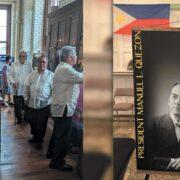Raving gratitude for Maestro from his students
“I am not in awe of people per se, because we are all pilgrims, we are given everything. Why am I here? I am medium when it comes to talent. Supernatural talent comes from the Higher Being – bigger than all of us. I surrender my fate to Him, as He alone owns all of these. I am a human being still learning in life — how to be loving and how to be caring for others. It is important for me to teach as much as I can—it is up to you to spread it around.” – Maestro Ryan Cayabyab, Asian Journal MDWK Magazine, October 2016.
When Geneva Cruz sang “Kailan” (kailan)/Kailan mo ba mapapansin ang aking lihim/Kahit ano’ng aking gawin/di mo pinapansin (When? When will you discover my secret? Whatever I do you are not paying attention),” you could sense that she wants to live up to the highest quality of musicality that the audience has experienced from Maestro Ryan Cayabyab and the Ryan Cayabyab Singers (RCS), those who had performed before her, the likes of Becca Godinez, Annie Nepomuceno and Miguel Vera.
At sound check, as the opening bars of “Kailan” played out, Yong Chavez of ABS-CBN whispered, “Asan si Geneva Cruz (Where is Geneva Cruz)?”
Much like prescience, Cruz — dressed in her long blue gown with a ruffled bordered slit, á la Angelina Jolie — appeared, to the surprise of Maestro Ryan, and sang “Kailan.”
“I was nervous, because Tito Ryan was my mentor. He discovered me when I was twelve,” Cruz told the audience at the Alex Theatre in Glendale, California, after hugging the Maestro twice.
“In both concerts, I saw with the Maestro and the RCS, a defining character of the show is it will make you feel proud you are a Filipino. His [Ryan]’s own narrations made me understood his genius, his compositions helped me appreciate more of the treasure trove we have as a nation and having all these sang, and performed on stage by singers nurtured by him and to achieve this kind of excellence [is] one for the books. Truly, The Maestro. And yes the RCS are awesome. Though I would have loved more the stage, if the digital works were clearer. But then the intensity of the group was outstanding. I told my friend [to] never miss a Ryan Cayabyab and RCS concert for it never fails to set a benchmark of excellence. It was totally pure music, incredible singing prowess, very good repertoire and Geneva Cruz was a so pleasant surprise. Now you know a good show and The Maestro never ceases to amaze. Thank you Annie Nepomuceno! And why I was proud to be a Filipino? It is because Ryan made it so clear that we have our own world in the music universe, unparalleled,” Ed Rame wrote in his Facebook post.
Cruz then sang “Paraiso,” a song written by Maestro Ryan, which won the grand prize at the 1993 Tokyo Music Festival.
“I live in this land called paraiso/ In a house made of cardboard floors and walls/ I learned to be free in paraiso/Free to claim anything I see. Matching rags for my clothes/Plastic bags for the cold/And if empty cans were all I have/ what a joy/ I never fight to take someone else’s coins and live with fear like the rest of the boys/Paraiso, help me make a stand/Paraiso, take me by the hand/Paraiso, make the world understand that if I could see a single bird, what a joy/This tired and hungry land could expect/Some truth and hope and respect/From the rest of the world.”
Her soulful rendition spoke volumes and the audience heard every word she sang, which touched many hearts, to call out bravos.
After the concert, Maestro Ryan told this writer that local popular artists’ involvement is what made this concert much better than their last. Indeed, the local artists amazed the audience, as they too, “leveled up their performances,” accompanied by the Maestro on the piano.
The Harana Men’s Chorus’ rendition of Annie Nepomuceno’s new arrangement of “Sa May Bintana,” an original composition of Maestro Ryan, was an audience hit.
Each holding a microphone, the tenors — Jake Labado, Michael Zuniga, Don Sagarbarria, Kenneth Laurente, Dennis Jardiel and Erwin Andaya — gave their best vocal sounds.
Even more impressive was their rendition of “Ikaw ang Mahal Ko.”
The opening bars quieted the audience which was so focused and hung onto every lyric sung by this group, giving the group a superior performance.
But “Iniibig Kita” made us fall in love again, when these were sung: “Malaman mo lang, Wala ng Iba, Mas Hihigit Pa, Sa Pagibig Ko sa Iyo.”
It was as if they all read what the Maestro told the Asian Journal’s MDWK Magazine in his 2016 interview, “We can’t turn out good musicians unless they have played with the literature of orchestra. They must have played with symphonic works, they study pieces and do solo pieces. They must have had a chance to sit at the end of the orchestra, for immersion.”
No wonder Maestro Ryan introduced them as the premier male choral group in the world and the crowd went wild with applauses and hollers.
First songwriter and her first gold award
But, truly, another gem that evening was Becca Godinez. She recalled how Ryan appeared on “Happiness Is,” her first television show at the age of 12.
She then composed a song in English, Sam, which her producer said would be a hit, if translated in Tagalog. George Canseco translated it and “Bakit ba ganyan ang pag-ibig? (Why is Love that Way?) became her first hit song, as predicted, and she bagged her first gold award.
Godinez was the pioneering female songwriter and composer of pop music in the Philippines, preceding Odette Quesada, who was in the audience that night.
Just like the multi-awarded Godinez, Maestro Ryan got an Awit Award for the Best Novelty Recording of his original, “Da Coconut Nut.”
Giselle Tongi-Walters — also known as G — dressed in a luminous yellow dress, sang “Da Coconut Nut,” with a troop of children from the Kayamanan ng Lahi Philippine Folk Arts, wearing bright colors of kimona. Right beside her was her daughter, Sakura, who sang and danced. She seemed to be as comfortable onstage as her mom.
Much to the audience’s delight, G sang quite well with lightness and joyful energies, as the children accompanied her while dancing.
G posted on her Instagram, “We are all the colors of the rainbow, performing with children of KNLfolkarts and Sakura on stage was so much fun! I love my knlfolkarts family sooooooo much!”
As much as she enjoyed herself, the audience mirrored that joy as well.
El Filibusterismo, Ramahari, Spoliarium excerpts
All three were musicals written by Maestro Ryan, 11 in total.
El Filibusterismo’s song, “Awit ni Isagani” was sung by Miguel Vera. It was a beautiful, heartfelt rendition evoking such tenderness, with a visual collage of Eliseo Art Silva’s commissioned painting for the Rizal Day celebrations in Philadelphia. It features Inang Bayan hovering above the birthplace of Rizal in Silva’s hometown of Calamba, Laguna. On the right of Rizal’s portrait are the main characters of his novel “Noli Me Tangere”: Maria Clara with Crisostomo Ibarra.
Had the projector fully illuminated these digital images, it would have had a more visual impact.
Annie Nepomuceno sang “Iduyan mo,” a tribute to Basil Valdez, as if swinging the hammock, back and forth, and with such slowing down and pacing of her lyrics.
“Iduyan mo ang duyan ko/unti-unti itulak mo. It did the trick for the audience. The “Rama Hari” song, “Magbalik Ka Na, Mahal,” was a hit as well.
The audience’s favorites
A retrospective journey to the 1950s, skip 60’s, to the 70’s, skip ‘80s, to the ‘90s created a stir. At some point, they were humming and joining in vocalizing the lyrics.
The Ryan Cayabyab Singers (RCS) could not have been better. The “Galawgaw” song created a tease, but when “Waray Waray” was sung and danced to as well, the audience was primed for the picking.
Then the sounds of “No money, no honey” accompanied by adept tap dancing wowed the crowds.
And of course, the song, “O Ang Babae, pag iyong ini wan, hahabol-habol (Oh, a woman, when you leave her, she chases after),” and “Rock Baby Rock,” complete with twirls delighted the audience so much.
By the time it was the tribute to Francis Magalona, RCS sang: “Mga kababayan ko, kaya mo, kaya ko, kaya natin,” our hearts and souls were ripe for picking.
Then, the clincher songs “Sirena”, and “Sabihin Mo Ikaw ay Pilipino” resonated.
During these two songs, no one was talking in the audience, no one was moving, and everyone was hooked to the lyrics of “Sirena,” a rap song composed by Glock-9, about a gay son who lived with a hostile, harsh father. He is talking about his struggles, his sufferings and how all the siblings had left home.
When the father was on his deathbed, he summoned his gay son to apologize for treating him so badly and said, “You gays are more men than men.” It touched us and made some folks cry.
Since that weekend was about LGBT pride, the song was quite relevant those sectors of the audience, some of whom were quite vocal in expressing their appreciation for Maestro Ryan and the RCS.
When the cast sang their final song, “Sabihin Mo Ikaw ay Pilipino,” you would think folks would be tired, as it was close to three hours by then, yet most stayed until the finale.
These lyrics resonated with this writer, as much with the audience as it spoke to our collective truth: “Sabihin mo ikaw ay pilipino Kahit saang bansa ikaw ay mag punta Sabihin mo ikaw ay Pilipino Pilipino ka, yan ang totoo (Tell them you are Pilipino/Whatever nation you go/Tell them you are Pilipino/That is the truth).”
Asuncion Ferrer, a retiree, had this to say, “It was good to know that [Ryan’s] students [Annie Nepomuceno, Ed Nepomuceno] are now the ones teaching musicality to the new generation of musicians. Ryan is a genius of our lifetime and contributed much to the OPM (Original Pilipino Music) we are now enjoying. Sana ibalik ang “Musikahan” to introduce our next generation to Filipino music.”
Next generation of musicians
“Ryan Ryan Musikahan” was Maestro Ryan’s television show for years. It garnered 14 awards from various award-giving bodies, such as Best Television Musical Show and Best Show Host for him.
As Ryan narrated, the LA version of Smokey Mountain has been discovered: Edsel Sotiangco, Michael Keith, Louisa Tampi and Josie Gonzalez. Sotiangco had his modern style of singing “Street People,” backed by a Kulintang ensemble, while Gonzalez so tenderly sang “Can this be love I am feeling right now?”
Tampi sang with such a hopeful, sensual style that it was so credible to hear the lyrics from her: “Together we will find a hideaway/where we can stay from day to day.”
Michael Keith confided how nervous he was and that he was shaking coming onstage, yet, did not reveal those while he competently sang “Mama” and these lyrics: “Mom you were gone since I was five” got seared in our hearts, as any listener would. He sang with such abandonment that the crowd just quieted down on their own especially when he sang the list of jobs that distant moms do: governess, nurse and more.
Bravo to these next generation singers who are strong academically but also, in musicality, ranging in age from 12 to 19 years old.
Now, we all have been shown the light by Maestro Ryan and to the next generation of students, it is up to you to spread your wings and be the light, using your musicality!
Annie Nepomuceno, you produced with superior results, the venue had the best sound projection and acoustics. Not only did you excel as a producer, arranger, you did it too as a singer and inspirer-in-action!
What a seamless, impeccable show! This recent concert was phenomenal and if you were there, you would have witnessed history — our history — of quality, collective expressions of musicality, performance arts and mentoring. This writer is, in fact, coming back to see another show in San Diego just to relive these beautiful, joyful moments!
Ryan Cayabyab is more than a musical genius. He elevates other singers, younger generations to exceed his musicality. This is the best of our Filipino-Americans in the U.S., mentoring one another to perform at their soaring level best.






